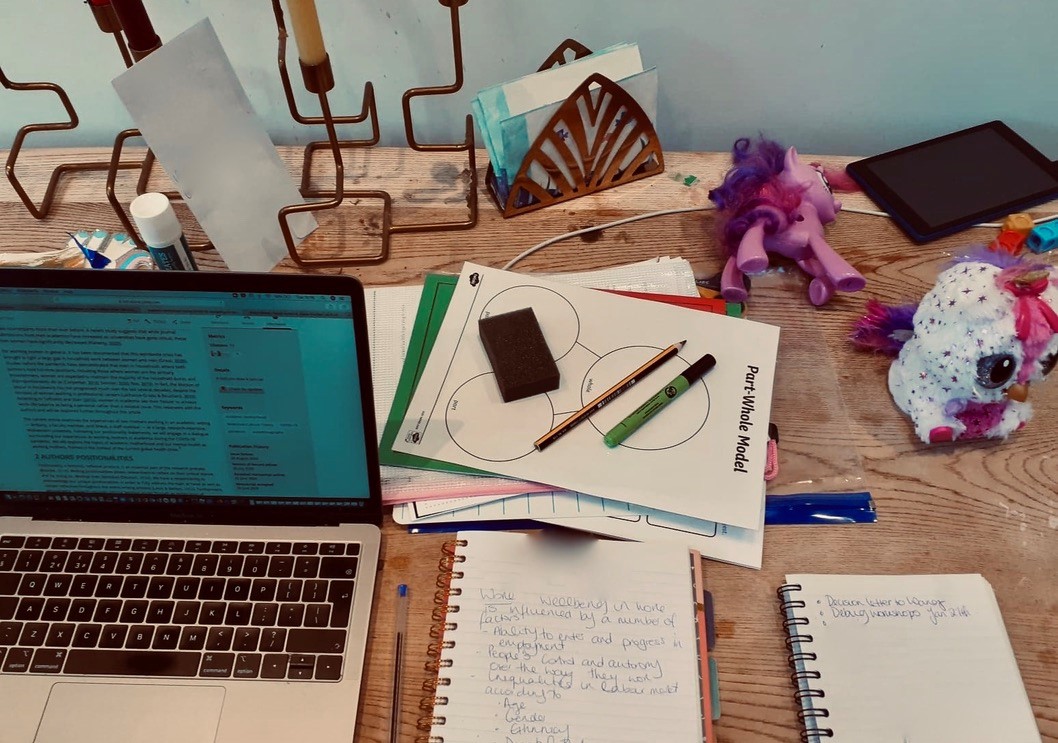I study the wellbeing of individuals within organisations and this has helped me understand the varying impact of COVID-19 on different social groups including women. Organisations and companies really need to understand this to avoid potentially damaging consequences.
During the worldwide COVID-19 crisis, being a working mother has taken on a whole new meaning, as many women have been suddenly presented with the challenges of working from home, home schooling and trying to make sense of these new and competing identities along the way.
As we already know, women (and especially those from BAME backgrounds) face stark inequalities for promotion, pay and workload, even before this international health crisis began in early 2020. There has since, been a spotlight shone on the gap in household work between men and women. Studies have shown that even in households where women were the primary breadwinners, they have been expected to carry out the majority of the household duties; and do so willingly.

According to the UK Trade Union Congress 14/01/2020, just like the first lockdown, mums are shouldering the bulk of the childcare. Bosses must do the right thing, and offer maximum flexibility to those who can’t work because of childcare. As a last resort, parents must have a temporary right to be furloughed.
Overall, there is a bigger picture to consider, which impacts us all. These daily challenges faced by women, can have far wider consequences, forcing women in the end, to choose between their duties at home, and their organisations. The resulting and starkly frightening statistic, is that if left unmitigated, women are 1.8 times more vulnerable to this crisis than men. It has been found that women’s jobs make up 39 percent of global employment but account for 54 percent of overall job losses.
So, what does this mean for working mothers? And single parents?
Women’s wellbeing, if not mitigated, risks being adversely affected by these pressures, which may impact negatively on medical and mental health services, and in turn the NHS. According to McKinsey and company, it has been shown that in a gender regressive scenario, where no action is taken, GDP growth could be $11 trillion lower in 2030, compared to growth in line with men’s. Conversely, if organisations were to take action to support and nurture working mothers and single parents now, it would result in $13 trillion being added to the global GDP by 2030.
According to the IER, women from BAME backgrounds are even worse affected. Within the group ‘women’, there is the intersectionality according to many factors (age, class, sexuality, disability and race). It would therefore be a mistake to look at women as a homogeneous group of employees, with common challenges. Organisations therefore need to be aware of the individual needs of their female employees, and facilitate them through this time of global crisis.
According to research by the Trade Union Congress, around 1 in 8 BAME women are employed in insecure roles, compared to 1 in 16 white women, and 1 in 18 white men. In addition to low pay, which no doubt has an impact on physical and mental health outcomes, BAME women are disproportionately represented in high risk occupations, such as front-line health and social care services.
Without mitigating the impact of COVID-19 on women, both at work, and in the domestic sphere, it is clear that consequences will be wide ranging, and serious. It’s important employers recognise the impact this global crisis has had on women, especially BAME, single parents and younger women. As organisations adapt to new ways of working, it is essential that women’s experience of working during COVID-19 is used for planning for our new ‘normal’ ways of working. Areas of importance and special attention should be:
- data collection;
- caring responsibilities;
- flexible working;
- homeworking;
- health and safety;
- undervaluation;
- pregnancy and maternity; and
- violence against women.
Women from all backgrounds can be retained within the workforce, and can have a bright and successful future, but only if organisations take action now, by learning from the experiences of their female employees, and incorporating this knew knowledge into future ways of working.
The future can be bright. But we need to incorporate what we have learnt today, to inform ourselves tomorrow.
Find out more about our MSc Organisational Change Management.
Dr Kunter’s publications include:
- Roper, I., Beauregard, A., Adamson, M., Miles, L. and Kunter, A., (2020). Diversity in the work-life interface: Introduction to the Special Issue. Equality, Diversity and Inclusion: An International Journal. 39 (5), 465-478
- Freeman, T., Kunter, A., Douglas, C. and Roper, I., (2015). Ethics and spirituality in the workplace. Human Resource Management International Digest. 23 (5), 43-44
- Upchurch, P; Kunter, A and Moore, P (2015) Marketisation, Commodification and the Implications for Teachers Autonomy in England' Sraffa and Althusser Reconsidered; Neoliberalism Advancing in South Africa, England, and Greece, Research in Political Economy, 29.


